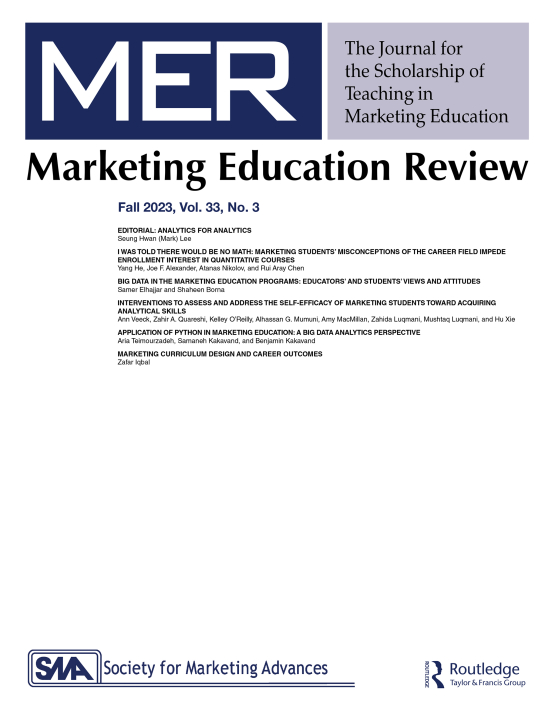Submit a Manuscript to the Journal
Marketing Education Review
For a Special Issue on
Transformative Pedagogies: Harnessing New Technologies to Elevate the Student Experience (Teaching Innovations Special Issue)
Manuscript deadline
01 September 2024

Special Issue Editor(s)
Priscilla Peña,
The University of Rhode Island, USA
[email protected]
Jen Riley,
Vanderbilt University, USA
[email protected]
Nicole Davis,
University of Georgia, USA
[email protected]
Transformative Pedagogies: Harnessing New Technologies to Elevate the Student Experience (Teaching Innovations Special Issue)
Submissions Open: July 1, 2024
As the educational landscape continues to evolve with the increased application of newer technologies (i.e., artificial intelligence, augmented reality, virtual reality, etc.), there is an urgent need to explore innovative teaching approaches and pedagogical considerations. The exploration of these technologies within marketing education is crucial for leveraging them in the classroom to enhance the student experience and educate students on their proper use for their post-graduation roles.
Assessing the pedagogical impact and integration of modern technology is essential for the marketing education landscape. With various elements threatening higher education as we know it (Riley et al., 2024), the student experience provided by academic faculty is an added benefit of formalized higher education over emerging competitors. As major businesses like Amazon, Meta, and Microsoft dedicate resources to innovative technology, opportunities to integrate them into the marketing classroom abound.
In particular, artificial intelligence (AI) can positively or negatively impact the overall student and faculty experience in the marketing classroom. Due to the sudden rise in AI usage, many faculty members question the negatives of AI, particularly plagiarism and ethical violations caused by using the software (Haenlein et al., 2022). However, as a growing industry application leveraged in many marketing roles, it is imperative that marketing education embraces this technology (Reisenbichler et al., 2022) and others to help prepare students for the workforce.
This special issue is dedicated to research and corresponding insights for integrating cutting-edge technologies to elevate teaching practices, increase student engagement, and improve learning outcomes related to technology usage and applications within the marketing classroom.
Topics to be considered for this issue may include, but are not limited to:
- Technology in Education:
- Exploring the impact of artificial intelligence on teaching methodologies and student engagement.
- Leveraging various technologies within the Marketing classroom for increased student engagement or learning experiences.
- Virtual and Augmented Reality:
- Leveraging immersive technologies to create dynamic and interactive learning environments.
- Teaching students how to leverage these technologies in marketing roles.
- Adaptive Learning Systems:
- Examining the effectiveness of personalized learning experiences powered by AI algorithms.
- Online Collaboration Tools:
- Assessing the role of collaborative platforms in fostering student interaction and teamwork.
- Gamification in Education:
- Investigating the use of game elements to enhance motivation and participation.
- Gaming in Marketing Education’s impact on student learning and learning outcomes.
- Ethical Considerations:
- Addressing ethical concerns related to the use of AI and technology in education.
- Innovative approaches to integrating and policing technology usage.
- Social Responsibility:
- Examining how changing technology serves as a vehicle to integrate social responsibility as a priority.
- Inclusivity:
- Utilize new technology to expand inclusivity in education, creating tailored learning experiences for diverse learners.
Authors are invited to submit original research, case studies, and reviews that contribute to understanding how new technologies can be effectively integrated into the marketing education process and student experience.
Authors should consider the following outline when preparing a manuscript:
- Introduction: Clearly articulate the educational challenge or opportunity that the technology or innovation addresses.
- Relevance to Course Objectives: Explain how the technology aligns with marketing course or curriculum objectives.
- Innovation Description: Provide a detailed description of the technology or application, including processes, time, and resource considerations.
- Novelty and Theoretical Foundation: Justify the technology’s novelty (or application novelty) and provide a theoretical foundation for its implementation.
- Effectiveness: Demonstrate how the technology effectively addresses the identified challenge or opportunity.
- Assessment Results: Report peer and/or student assessment results, as applicable, to validate the application’s effectiveness.
- Challenges and Adaptability: Summarize challenges faced during implementation and suggest strategies for instructors. Comment on the adaptability of the application across marketing courses.
- Blueprint for Adaptation: Include appendices that provide a blueprint for other instructors to adapt to the innovation
Looking to Publish your Research?
Find out how to publish your research open access with Taylor & Francis Group.
Choose open accessSubmission Instructions
Authors must select the Innovation Issue and not the regular issue. There is a 20-page, double-spaced maximum length for submissions (body, figures, tables, appendices and references). This page limit does not include the abstract or supplemental online material. Submissions not following the required formatting style will not be considered for publication.
Please consult the MER site for submission formatting requirements.
Call for Papers – Summer 2025 Teaching Innovations Special Issue
Submissions Open: July 1, 2024
Submission Deadline: September 1, 2024